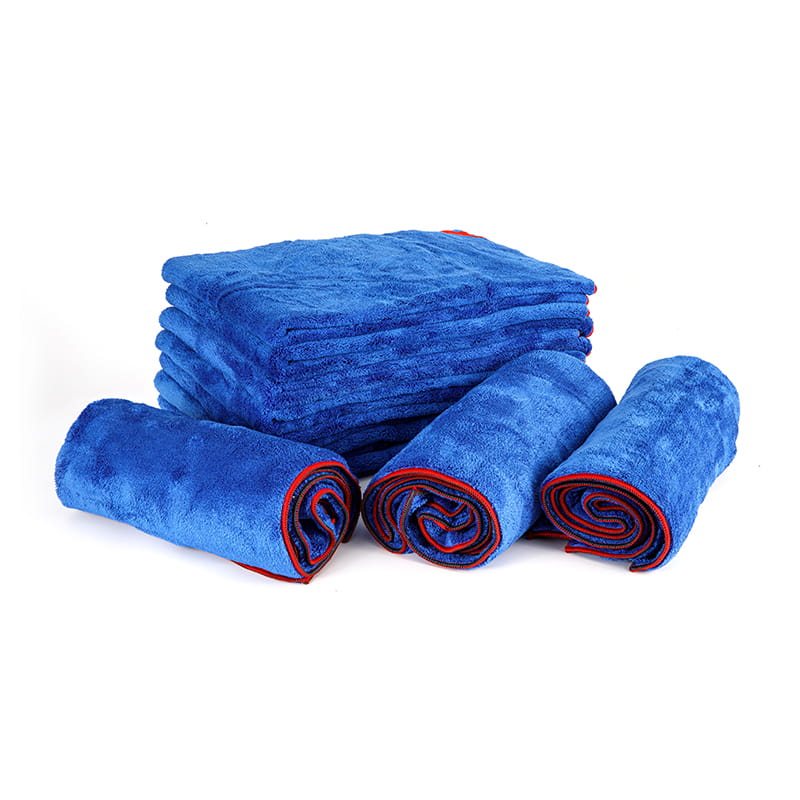We are a national high-tech enterprise. At present, there are many kinds of self-woven and cooperatively processed fabrics, including microfiber warp-knitted towel cloth, weft-knitted towel cloth, coral fleece, etc.
Absorption Capacity: The thickness of an absorbent towel significantly impacts its ability to absorb and retain moisture. Thicker towels, which are typically made with a higher pile height and denser fabric weave, are engineered to offer superior moisture absorption. This is due to their increased volume and surface area, which allow them to hold a greater quantity of liquid. In practical terms, a thick towel can handle substantial spills or excessive moisture without becoming saturated too quickly. For instance, in high-demand environments such as healthcare settings or in commercial kitchens, thick towels provide the reliability needed for effective moisture management. Conversely, thinner towels may have lower absorption rates, making them less suitable for scenarios requiring high moisture retention.
Drying Time: The drying time of an absorbent towel is closely related to its thickness. A thicker towel, while excellent at holding moisture, retains a larger volume of liquid, which inherently prolongs the time needed for it to dry after use. This can be a critical factor in environments where towels need to be turned around quickly, such as in busy gyms, hotels, or spas. The increased moisture content in a thick towel means it remains damp for a longer period, potentially affecting operational efficiency. On the other hand, thinner towels dry faster due to their lower moisture retention, which can be advantageous in settings where quick turnover is essential and space for drying is limited.
Durability: The durability of an absorbent towel is influenced by its thickness. Thicker towels are generally more robust due to their denser construction and additional layers of material. This enhanced durability allows them to withstand frequent use and laundering without significant wear or degradation. In commercial environments or for heavy-duty applications, the longevity of a thick towel makes it a cost-effective choice despite the potentially higher initial investment. Thinner towels, while often less expensive, may wear out more quickly under the same conditions, potentially leading to higher replacement costs over time.
Softness and Comfort: The tactile properties of a towel, including its softness and comfort, are significantly enhanced by its thickness. Thicker towels provide a plush, cushioned feel that can elevate the user experience, especially in personal or luxury settings. This added comfort is particularly valued in bath towels, where users seek a soothing and indulgent drying experience. The increased fabric volume contributes to a more luxurious sensation against the skin, which is less pronounced in thinner towels that might feel less plush or soft.
Weight and Bulk: The weight and bulkiness of a towel are directly affected by its thickness. Thicker towels are heavier and more substantial, which can impact their portability and ease of handling. This added weight may be a consideration for users who need to transport towels frequently or for those with limited storage space. In contrast, thinner towels are lighter and less cumbersome, making them more suitable for travel or for environments where space is at a premium. The balance between weight and functionality must be considered based on the specific needs of the user.
Drying Performance: Drying performance is a key factor influenced by towel thickness. Thicker towels excel in absorbing large amounts of moisture, making them ideal for applications where substantial liquid management is required. For example, a thick beach towel or bath towel will efficiently absorb water from the body or from spills. However, the trade-off is that the drying process for these towels is slower. Thinner towels, while less capable of holding large volumes of moisture, dry more quickly and are therefore better suited for situations where rapid drying is necessary.
1PK 700GSM high density coral fleece car towel/blanket towel/beach towel


 English
English Espaol
Espaol русский
русский عربي
عربي 简体中文
简体中文
















